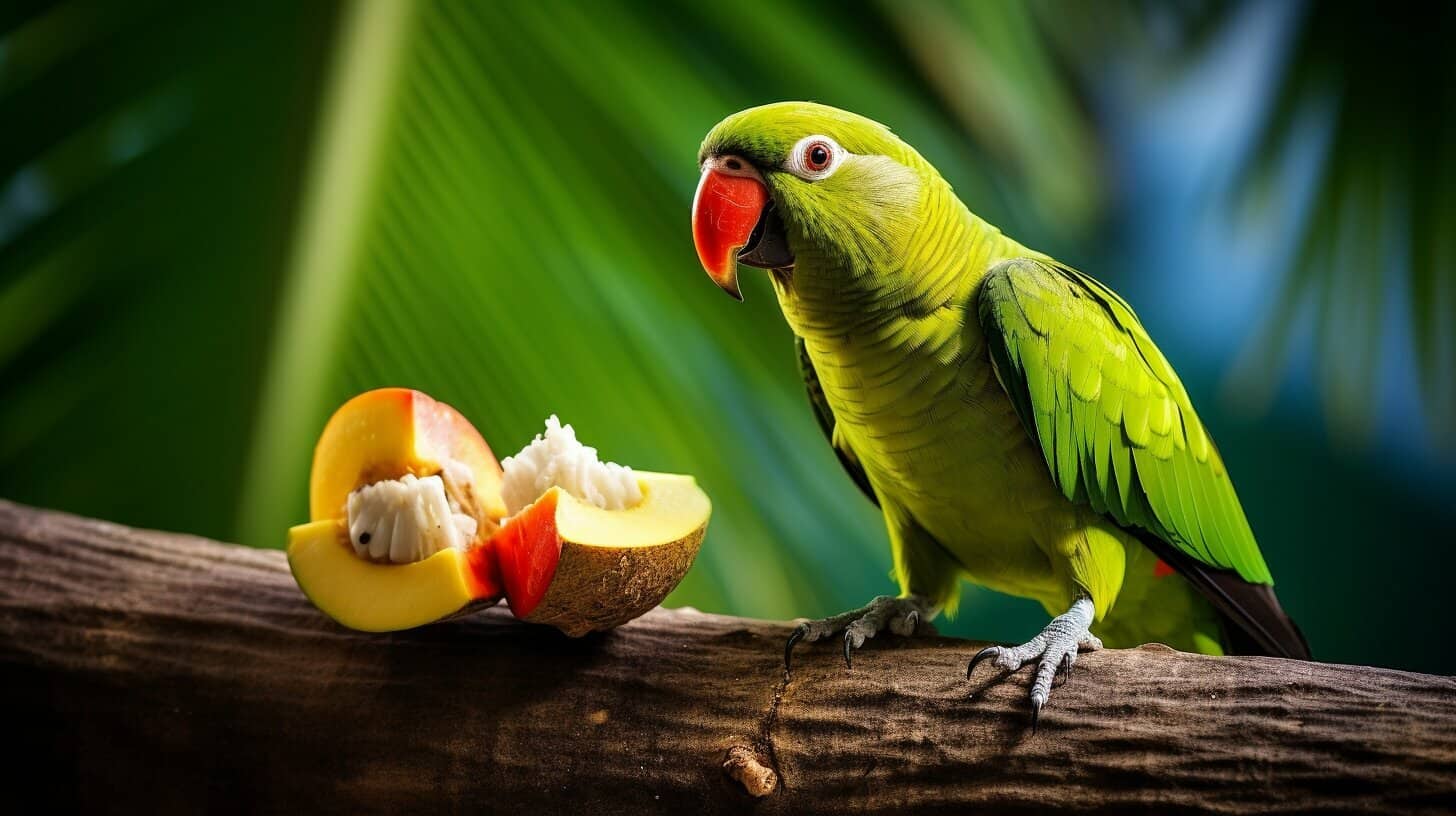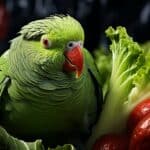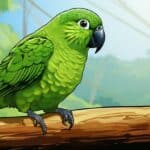Welcome to our friendly guide on the diet of kakarikis, adorable little parrots with big personalities. One of the questions we get asked frequently is, “Can kakarikis eat coconut?” We’re here to answer that question and provide you with all the information you need to make informed decisions about your bird’s diet.
Can Kakarikis eat coconut? Yes, Kakarikis can eat coconut. This type of parrot enjoys a variety of foods, and coconut is safe for them. It provides key nutrients like fiber, vitamins, and minerals. Always serve it fresh and in moderation to maintain their health.
As a responsible pet owner, it’s essential to understand what your kakarikis can and cannot eat. Every bird species has different nutritional requirements, and it’s crucial to provide them with a balanced diet to keep them healthy and happy. So, let’s dive in and explore whether coconut can be a part of a kakarikis’ diet.
Understanding Kakarikis’ Dietary Requirements
Kakarikis are active and friendly birds that require a balanced diet to remain healthy. Their diet should consist of a variety of fresh fruits, vegetables, and high-quality pellet-based food. Additionally, it is important to provide them with a range of seeds, nuts, and other sources of protein.
It is essential to ensure that your kakarikis’ diet is rich in nutrients and vitamins. Vitamin A is especially important for their eye and feather health. Calcium is necessary for their bone strength, and protein is vital for their muscle development.
Feeding your kakarikis a varied and balanced diet is crucial to their well-being. It is best to consult with an avian veterinarian to determine the best diet for your kakarikis, taking into consideration their age, health, and level of activity.
Introducing Coconut in Kakarikis’ Diet
If you’re wondering whether it’s safe to feed your kakarikis coconut, the good news is that it can be a nutritious addition to their diet if introduced properly. However, before offering this tasty treat to your bird, it’s crucial to consider their dietary needs and habits.
Kakarikis are herbivores, meaning their diet primarily consists of plants. They require a variety of fresh fruits, vegetables, and grains to stay healthy and active. That said, adding coconut to their diet can offer various health benefits.
| Nutrients in Coconut | Benefits for Kakarikis |
|---|---|
| Vitamins B and C | Enhance immune system |
| Healthy fats and protein | Provide energy and promote feather growth |
| Minerals (potassium, iron, calcium) | Support bone and muscle health |
When introducing coconut to your kakarikis’ diet, it’s essential to keep moderation and frequency in mind. While it’s a beneficial addition to their diet, it should not replace other essential foods. Offering a small amount of coconut once or twice a week as a treat is a great way to incorporate it into their diet.
It’s also important to ensure that the coconut you offer is fresh and unsweetened. Avoid giving your bird coconut that contains added sugar or other additives that could be harmful to their health.
If your kakarikis is not used to eating coconut, start by offering a small piece or a few shreds. Observe their reaction and wait for a day or two to see if there are any signs of allergies or digestive issues. If there are no issues, you can gradually increase the amount of coconut you offer.
Always keep fresh water available for your bird to drink, and consult an avian veterinarian if you have any concerns about your kakarikis’ diet or health.
Nutritional Benefits of Coconut for Kakarikis
Coconut is a nutritious food that can offer various benefits for your kakarikis. Here are some of the key nutrients found in coconut that can positively contribute to your bird’s health:
| Nutrient | Function |
|---|---|
| Fibre | Supports digestive health |
| Healthy Fats | Helps in the absorption of fat-soluble vitamins |
| Protein | Builds and repairs tissues |
| Iron | Carries oxygen in the blood |
| Potassium | Manages blood pressure and regulates heart rate |
| Vitamins B and C | Supports immune system function and energy production |
Coconut is also rich in antioxidants that can help reduce inflammation and prevent cell damage.
However, it’s important to remember that coconut should not be your kakarikis’ sole source of nutrition. Variety is key in ensuring your bird receives all the nutrients for optimal health.
Nutritional Benefits of Coconut Oil
Coconut oil has become increasingly popular in recent years, and you may be wondering if it can offer the same benefits to your kakarikis. Coconut oil contains medium-chain triglycerides, a unique type of saturated fat that can be easily digested and used as a energy source. However, it should only be given to your bird in small amounts as a treat, as it is high in calories and fat.
Preparing Coconut for Kakarikis
If you’ve decided to introduce coconut into your kakarikis’ diet, it’s crucial to prepare it correctly. Raw coconut can be difficult for birds to digest and could cause blockages in their digestive system.
Start by removing the hard outer shell, and then grate or chop the coconut flesh into small, bite-sized pieces. Alternatively, you can purchase unsweetened, dried coconut flakes or shreds, which are easier to prepare and have a longer shelf life.
To make the coconut more appealing to your kakarikis, you could mix it with other treats or foods that they enjoy. You can also try toasting or baking the coconut to give it a different texture and flavour.
Other Safe Foods for Kakarikis
While coconut can be a beneficial addition to your kakarikis’ diet, it’s crucial to offer a varied and balanced diet that meets all their nutritional requirements. Here are some other safe and nutritious foods you can include in their meals:
- Fruits: Offer your kakarikis a variety of fresh fruits such as apples, pears, grapes, and berries. Avoid feeding them citrus fruits as they can cause digestive problems.
- Vegetables: Kakarikis love leafy greens, such as lettuce, spinach, and kale, as well as root vegetables like carrots and sweet potatoes.
- Grains: Offer cooked grains like rice, quinoa, and oats. Avoid offering raw grains as they can be difficult for your kakarikis to digest.
- Protein: Kakarikis require a source of protein in their diet. Offer them cooked eggs, chicken, or tofu in small amounts.
- Treats: Kakarikis enjoy a variety of treats, such as millet spray, popcorn, and unsalted nuts. However, treats should be given in moderation and not make up a significant portion of their diet.
Remember always to introduce new foods gradually to monitor your kakarikis’ reaction and avoid any digestive issues. Additionally, providing fresh, clean water every day is essential for their health.
Moderation and Frequency of Coconut Feeding
While coconut can offer many nutritional benefits to your kakarikis, it is important to remember that moderation is key. Too much coconut can lead to health issues, including weight gain and digestive problems.
Experts recommend feeding coconut as a treat rather than a regular part of your kakarikis’ diet. A small amount of coconut once or twice a week can be a delicious addition to their meals and provide them with the necessary nutrients.
Remember to balance coconut with other safe and nutritious foods to ensure your bird receives a well-rounded diet.
Signs of Allergies or Digestive Issues
While coconut can be a nutritious addition to your kakarikis’ diet, paying attention to any signs of allergies or digestive issues that may arise after introducing it is crucial. Some of the symptoms to look out for include:
- Diarrhoea
- Vomiting
- Lack of appetite
- Excessive itching or scratching
- Inflammation or rashes on their skin
If you notice any of these symptoms, it’s best to remove the coconut from their diet immediately and consult with an avian veterinarian. Allergic reactions or digestive issues can become serious if not addressed promptly.
It’s also essential to monitor how much coconut your kakarikis are consuming. While it can be a healthy treat, too much of it can upset their digestive system and lead to obesity or other health problems.
Remember, as with any changes to your bird’s diet, it’s always best to introduce new foods gradually and in small amounts. This will help you monitor their reaction and ensure they don’t experience any adverse effects.
Consulting an Avian Veterinarian
If you have any questions or concerns about your kakarikis’ diet or health, it is always recommended to consult with an avian veterinarian. They can provide expert advice on properly caring for your bird and ensuring they are receiving the necessary nutrients in their diet. Additionally, if you notice any signs of allergies or digestive issues related to coconut consumption, seek veterinary assistance immediately.
FAQ – Can Kakarikis Eat Coconut?
As a pet owner, being mindful of what your kakariki eats is essential. Coconut is a popular food item that many bird owners want to introduce to their pets but may be unsure if it’s safe or beneficial. In this section, we answer frequently asked questions related to feeding coconut to kakarikis.
Can kakarikis eat coconut?
Yes, kakarikis can eat coconut, and it can provide valuable nutrition. However, it’s essential to introduce coconut in moderation and ensure it’s prepared correctly.
What are the nutritional benefits of coconut for kakarikis?
Coconut is rich in vitamins and minerals, including potassium, magnesium, and iron. Additionally, it contains beneficial fats that can boost a kakariki’s energy levels and support healthy skin and feathers.
How should I prepare coconut for my kakarikis?
Coconut should be prepared in small pieces, roughly the size of a kakariki’s beak, and served fresh. Avoid feeding your bird dried or sweetened coconut, as it may contain additives that can harm your bird.
Can coconut be given as a treat?
Yes, coconut can be given as a treat, but keeping it in moderation is essential. Too much coconut can lead to weight gain and digestive issues, so offering it as an occasional treat rather than a regular part of their diet is best.
What are the signs that my kakarikis may have allergies or digestive issues related to coconut consumption?
If your bird experiences vomiting, diarrhea, or lethargy after eating coconut, they may be allergic or have digestive issues related to its consumption. If you notice any of these symptoms, it’s best to avoid feeding them coconut and consult a veterinarian.
Should I consult an avian veterinarian before introducing coconut to my kakarikis?
If you have concerns about introducing new foods to your kakarikis, including coconut, it’s always best to consult an avian veterinarian. They can advise you on the best diet for your bird and help you introduce new foods safely.
With careful preparation and moderation, coconut can be a valuable addition to your kakariki’s diet. However, always be mindful of any signs that your bird may be having digestive issues or allergies, and consult a veterinarian if you have any concerns.



Have comments or questions about this article? Then get involved!
Spotted an error or something we have missed? Let us know